|
|
|
|
|
Sean
Rhiney
|
|
|
|
Ever
wonder what it takes to design and
coordinate your very own music festival?
If so, this is the interview
for you! Way Cool Music spent
some quality time with Sean Rhiney,
lawyer/musician/co-founder of Cincinnati's
Midpoint Music Festival, to learn
about this festival that has grown
by leaps and bounds since it's inception
in 2002. Read about how the
founders first devised the plan,
took full advantage of the Internet
and harnessed the power of Cincinnati
loyalty to make MidPoint a reality.
|
|
|
|
| WC:
|
Tell
us a bit about your background in
the music business.
|
|
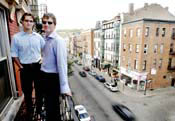
|
|
|
|
Sean
Rhiney:
|
I'm
in a couple different bands. Actually,
I'm in three bands now because one
is just never enough. I didn't get
into rock and roll until post-college,
here in Cincinnati. I'm still in
Clabbergirl and Pike 27, which is
a roots rock band. I'm also playing
in a band called JC3 now, which
is a hard rock band. I play bass
in all three.
|
|
|
|
|
|
WC:
|
Did
you grow up in Cincinnati?
|
|
|
|
|
SR:
|
I
didn't. I'm from Louisville originally
and made my way up here to go to
undergrad at Xavier. I liked Cincinnati
so much that I stuck around for
law school and after.
|
|
|
|
|
WC:
|
When
did you start playing bass?
|
|
|
|
|
SR:
|
I
didn't start playing until my second
year at law school. We formed this
horrible, horrible cover band with
one of our other classmates. But,
it was my first chance to be in
a band. They asked, "Do you play
bass?" I lied and said, "Yes." I
figured that it had two less strings
than a guitar and I had learned
three chords at that point. The
drummer and I kept going and hooked
up with another guy, which became
the original version of Clabbergirl.
We just released a song a year for
a few years for some of the local
97x contests. Then, we made (Clabbergirl)
a real thing in 1999.
|
|
|
|
|
WC:
|
Clabbergirl
won the Cammy award in Cincinnati
back in the day...what are you
guys doing now?
|
|
|
|
|
|
| 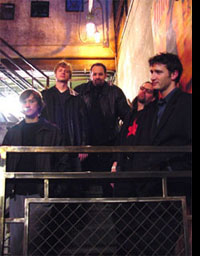
|
|
SR:
|
Well,
we went through all kinds of crazy
lineups. We lost our original guitarist
the night of our CD release. He
relocated out west. That's when
we expanded with multiple guitarists
and my partner in MidPoint, Bill
Donabedian, even became our keyboard
player. To be honest, the subject
of this interview is the reason
it's in stasis right now because
MidPoint came around in 2002. We
released our disc in 2001 and it
did really well, won a couple of
local awards. But, Bill and I started
buckling down on MidPoint. It kinda
takes up most of your year. So,
that makes it hard to record. I
think, at that time, guys in the
band were in two other bands which
can also take away some of your
focus. But, we are working on stuff
and, hopefully, we'll be playing
out again. We ended up having to
sub this year for a last minute
MPMF cancellation. Someone came
to me on the last night at MidPoint
and said, "This Dallas band just
called and said that somebody's
pregnant." Apparently, the guitar
player's wife was having her baby
that day which sounded legit. We
laughed because it ended up being
the lamest excuse of MidPoint. That
won the award. Literally, 10 bands
used that excuse to cancel within
the week of the show.
|
|
|
|
|
|
WC:
|
Was
it the same woman?
|
|
|
|
|
SR:
|
Yeah,
she gets around. I'm sure one or
two had merit, just playing the
odds of 250 artists coming in from
all over the United States to play.
But, I just got so tired of booking
people in that I called my guys
up and said, "We're playing tonight."
We had already been accepted, but
it was the one year I said that
we weren't going to play just because
I'd been so busy.
|
|
|
|
|
WC:
|
Tell
us how MidPoint Music Festival came
about.
|
|
|
|
|
SR:
|
Bill
and I are good friends. We had met
in 2000 when I organized a tribute
to a local band called The Psychodots,
which is a fairly famous midwestern
band. All the really strong local
bands on the pop scene were big
fans of theirs and my band organized
this tribute to benefit a public
radio station here. Bill's band,
Crosley, was there and we started
talking early on about the concept
that because Cincinnati has such
great, diverse musical talent we
ought to do something to attract
attention to it. A couple folks
had organized one-night, multi-band
fests for different causes and different
reasons. Some of which were doing
really well. We asked, "What does
it take to attract the attention
of the media to this hotbed of local
talent?" It takes making it an event
rather than just another show. We
started formulating what MidPoint
could be in October or November
of 2001. We worked up a plan to
do, maybe, 100 bands over a couple
of nights in Cincinnati and Northern
Kentucky since that's where all
the great clubs are. We fleshed
out the details of how we'd do it
with really just Bill and I focusing
on it. And then, I woke up on January
1st to a website that Bill had created
with a call-out for entries. So,
obviously we were serious. And,
it really just snowballed from there.
It never would have gotten off the
ground but for the fact that we
are both fairly well integrated
into the local music scene. People
gave us a lot of support and encouragement,
and we had a lot of participation
by local artists. Then, the question
was would national and midwestern
artists come...and they did. I'd
say 35 ö 40% are from our regional
base, which is as far north as Dayton,
Ohio and as far south as Louisville,
Kentucky. 35% are from the Midwest
region...everywhere from Iowa,
to Chicago to West Virginia. Another
20% comes from the East Coast and
another 5 ö 10% from the West Coast.
It's been fairly consistent every
year.
|
|
|
|
|
WC:
|
Was
the idea of including keynote speakers
and music industry people in the
festival in the original planning
concept?
|
|
|
|
|
SR:
|
Absolutely.
We had never attended one before,
you know, South by Southwest or
North by Northeast or Mobfest in
Chicago. We only knew generally
how they operated. We knew we wanted
to bring in industry people to a
conference...to make it worthwhile
for them as well. They all want
to discover a new band, but they
all want to network with one another
too. We knew we wanted to give worthwhile
presentations that weren't fluff
and wanted to bring in big names.
What ended up being in our favor
was that there are a lot of people
from Cincinnati who are major players
in the industry. They signed up
right away. All I had to do was
make a phone call, and when they
knew I was from their hometown they
were really generous. They started
referring people our way. People
you wouldn't expect. Ken Lewis is
one of our biggest supporters. Ken
is from Cincinnati, but works in
New York City. Ken engineered both
the Kayne West and Usher albums,
so he is having a good year you
could say. He was up for a total of
10 Grammys for his work this year.
He's been here every year, so generous.
And, Mike Meisel and Peter Rauh
are artist managers that managed
Nirvana and Foo Fighters for years.
Both are Cincinnati guys. They helped
legitimize us in our first year,
which is the hardest year, I think.
But, we've really expanded our reach
and grown with our panelists and
made it worthwhile for them and
for our attendees.
|
|
|
|
|
WC:
|
Since
that first year, what kinds of things
have changed?
|
|
|
|
| SR:
|
We've
grown. 100 bands in the first year
to 250 bands this past year. There's
a significant change from the first
year to the second year since we've
moved everything into downtown Cincinnati.
The first year it was in downtown
Cincinnati and Northern Kentucky,
in Covington and Newport, which
are really just right across the
bridge from each other. We decided
to condense everything into Cincinnati
in the second year. We've got an
entertainment district that is already
set in place that has 15 different
venues, the majority of which are
within a block of each other, and
a few more that are only four or
five blocks away. So, it makes everything
more accessible and condensed. It
makes it easier from an administrative
standpoint too. Ultimately, it benefits
the artists because, if you are
going to drive all the way from
Ames, Iowa to play a show, and you
aren't getting paid a lot of money
or you accepted conference badges,
you want exposure. You want to play
in front of a lot of people. And,
if people are having trouble getting
around, they aren't going to catch
everyone that they want to see.
It's the one thing I've noticed,
remarkably, from the first year.
Literally, on Friday and Saturday
night, every venue is packed. That
wasn't the case the first year.
The first year was about 10,000
people over three nights, Thursday
through Saturday. The second year
was 25,000. This past year, we had
about 40,000 (attendees). We increased
our venues. We increased our stages,
but not significantly. I think that
250 bands is a good number, especially
with where we are now. It may grow...it really depends on the quality
of the submissions. We don't set
a number when we start. The last
thing we say is that we have to
fill 250 slots. Because if there
aren't 250 bands that our listening
committee judges are above a certain
level, we won't increase it just
for size. It just turns out that,
in 2004, we had a lot of really
strong entries. That's how the festival
grew, and that's how it'll stay
as long as we still have this great
district in downtown. You have the
proximity. This set up is very much
like one of my favorite places in
the whole world, New Orleans. But,
there's nothing better that. If
you are not from here, if you are
staying in a hotel, you can walk
to the district. You can walk from
club to club. It's just steps to
some shows. In fact, you could see
three to five different artists
in one hour. You could catch one
song and move on if you wanted.
|
|
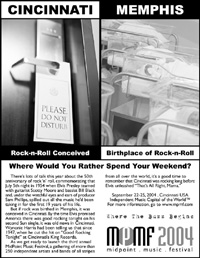
|
|
|
|
|
|
WC:
|
How
are the businesses in the area reacting
to all of this going on?
|
|
|
|
|
SR:
|
They
really appreciate it. Unequivocally,
every bar owner will tell you that
it's their best weekend of the year.
That tops Oktoberfest, which is
just insane around here. That tops
Jammin' on Main which has been a
big festival downtown. This is their
best bar weekend of the year.
|
|
|
|
|
WC:
|
How
has MidPoint changed the overall
music scene in Cincinnati?
|
|
|
|
|
SR:
|
In
awareness. In the last couple of
years, there has been a strong movement
towards focusing on local artists
in the general media. People are
recognizing that it's not necessarily
a commodity, but music is as much
a part of the fabric of the city
as doctors, lawyers, salespeople...people like that. We aren't LA or
New York City, nor would we want
to be. Now, the music community
is being recognized, and this festival
helps promote it. I think all media
likes it when something like this
is packaged. Just ask them to explain
Fugazi on the morning show to their
viewers...they'll have a heart
attack...it's unexplainable. But,
give them a festival, an event that
is fun. On top of that, there are
bands that, in a year or so, will
be playing to bigger audiences,
will be playing on the radio. It's
undeniable that it's going to happen,
and it's already happening for some
bands.
|
|
|
|
|
WC:
|
Have
you heard from any bands who've
been able to keep that momentum
going?
|
|
|
|
|
SR:
|
We've
kept track of our alums from years
past to see how everybody's doing.
What we do have are a ton of artists
who have hooked up with producers,
in the first year even, who are
getting their album produced by
people like Ken (Lewis). Ken produced
a band that he saw out of the first
year of being here. Kim Taylor,
a fabulous Cincinnati artist, now
has management out of Boston from
one of our panelists. Things like
that happen on a pretty consistent
basis. And, there are plenty of
buzz bands that are a step away
from the next level.
The
other things about connections are
the artists from different cities
connecting with each other. I can't
keep track of the number of artists
who came to MidPoint the first year
who came back through Cincinnati
the next year. They've found all
these great venues and all these
great comrades-in-arms, and vice
versa. Now, there are all these
local bands who are playing venues,
on good bills, with other bands they got
to see play at MidPoint. (When you
are) booking shows that you never
know whom you'll end up booking
your artist with. So, they may be
with the worst band in the world
or some band that has no draw. But,
the festival gives them the chance
to see other artists play and say,
"We would be a great match," or
"Our music sounds nothing alike,
but we both drink the same amount
of beer." That's what happened.
|
|
|
|
|
WC:
|
What
are some of the criteria that your
listening committee uses to decide
who plays the festival?
|
|
|
|
|
SR:
|
We
have a listening committee comprised
of artists, producers, engineers,
A & R people, people generally
in the industry, disc jockeys for
modern rock stations, etc. We have
a listening system that is criteria
based. It's based on a lot of things
you'd expect. You are evaluated
on the songs that you submit. So,
strong song writing always tends
to do well. That being said, being
unique and diverse tends to make
you stand out. There are ways so
that it is all balanced out. You
have to evaluate three different
songs, evaluate an artist's originality,
their background, their resume,
have they played festivals, etc.
Being established helps, but there
are artists who were brand new,
who got together just a few months
before MidPoint that were phenomenal.
It was their talent that got them
selected. And, there are artists
that have moved 10,000 units and
have recorded five or six discs
that also play at MidPoint. We don't
set out looking for anything in
particular. It's been a rock festival
primarily because 60% of the bands
in the US are rock bands. That being
said, we've still crossed over and
always had DJ electronic every year,
still had hip-hop, R & B, and
soul. We still had roots, honky
tonk, and a little country.
|
|
|
|
|
|
| 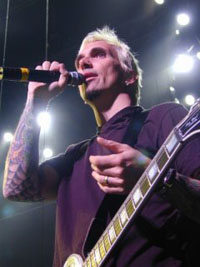
|
|
One
interesting thing about the selection
process: Bill and our webmaster,
Mike Dewees, designed an online
press kit that allows anyone on
our committee who has a broadband
connection to access the electronic
press kit of the band, look at the
photos, look at the press kit, read
the bio and then listen to the songs.
The judges love it because they
can fly through it and really get
a good taste of some of these bands
in the comfort of their own home
or studio. Some of them are very
interested in hearing the bands.
I've had members of our listening
committee call me before the festival
kicked in to ask if they could contact
a band they just judged because
there was a song that they really
dug. So just by submitting, you
expose yourself to people who could
advance your career, which is an
interesting thing. I don't think
another festival or conference that
I've participated in even touts
that.
|
|
|
|
|
|
WC:
|
Since
you do have such a diverse kind
of music, are certain judges assigned?
|
|
|
|
|
SR:
|
What
Bill and I strive to do when we
invite judges to be part of the
process is that we look for a diverse
group of people who are experts,
maybe very good in a particular
genre, but all submissions are randomly
assigned.
|
|
|
|
|
WC:
|
What
kind of tips can you give bands
looking to play the festival this
year?
|
|
|
|
|
SR:
|
Overwhelmingly,
people are looking for good songs.
It doesn't have to be the super
produced song. You don't have to
spend $5000 in the studio to get
it right. That being said, your
boom box and your hard rock band
in your basement are not going to
do well because no one is going
to be able to actually hear your
message. In the brief time allotted
to evaluate, people aren't going
to catch on. But, I'll contradict
myself; there was a guy who played
acoustic, it was just him and his
boom box and, man, did it work.
It was phenomenal, the songwriting
was stellar. The song was just good
and I didn't care that he did it
on his boom box.
People
always talk about the cost of submitting
to these festivals. Bill and I are
constantly coming up with ways to
give artists more value for what
they are paying. We figured out
that, this year, for your registration
fee, not only did you get considered
for the festival, which, if selected,
you got paid or received all access
badges for your whole band, a value
of up to $700, you were instantly
considered for the compilation.
In addition, just for registering,
we gave away studio time and mixing
by Ken Lewis, along with 500 discs
printed up for free. Not bad for
a $20-30 investment.
|
|
|
|
|
WC:
|
Where
do you see the festival going in
the next five years?
|
|
|
|
|
SR:
|
It's
growing by reputation significantly.
We are getting calls, daily, from
the press such as Entertainment
Weekly and places like that. People
are starting to take notice of what
the festival is all about. They
like the uniqueness of it. Our panelists
are like our apostles. They love
it because they have such a good
time and tell others in the industry
about it. It's an efficiently run
conference and they get the most
out of it while they are here. I'm
getting calls from people saying
they are interested and want to
know more. So, it's expanding that
way. The bands go back to their
hometowns, be it Poughkeepsie or
down the road, and say, "This is
the festival to go to," so we're
seeing increased registrations from
these areas. It's fun to track the
growth. For example, Chicago submissions,
from our first year to this year,
have multiplied ten-fold. So, those
bands went back and told their friends
about it. They come back because
it's a worthwhile experience. It's
always going to pull a lot of artists
and talents from the Midwest, which,
I think, is a good thing because
there's nothing like it in the Midwest.
There's nothing that really does
it the way we do it, that offers
what we offer. And, has the high
quality of panelists that come in,
the venues that we offer...it's
always going to have that. Time
and time again, I hear that the
industry folks love it because it's
such untapped territory. I won't
name festivals, but if you go to
New York and see 50 bands, they
are all signed. It's great, but
they aren't going to get much business
done when you are in the industry.
And, if you are a no-name artist,
you are going to get overshadowed
by those artists that are signed.
You aren't going to get a great
spot. So, people see the value in
(MidPoint).
|
|
|
|
|
WC:
|
Tell
us some stuff you've learned about
the music industry, in general.
|
|
|
|
|
SR:
|
It
is a very aware industry. They recognize
the strength of independent artists,
which is what MidPoint is all about.
What's even better is artists are
more in control of their careers
than you could imagine. These are
people who are selling their own
CDs and marketing their own products.
They are doing things that bands
weren't doing 15 or 20 years ago.
Independent artists, as a whole,
are a force to be reckoned with.
And, the industry recognizes this.
It's always going to be an education
to make sure that artists are aware
of that. It's not about being seen
in that one club by that one guy
from A & M. It's about touring
your butt off or about putting together
something with a good producer.
Or, getting out and touring outside
of your own hometown if your town
is not on the main map. Those are
the kinds of things that are taught
at the festival. I'm a musician
and a lawyer, and I've learned something
every year by attending the panels.
I wish I could sit through all of
them and not be so busy, but there's
something to be learned. So, the
industry is aware and the artists
are aware. I've learned so much.
|
|
|
|
| WC:
|
With
you being a musician and having
a full-time job, and doing MidPoint
from May to September, how do you
juggle all of these responsibilities?
|
|
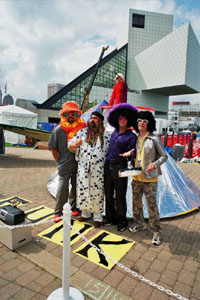
|
|
|
|
| SR:
|
We
have an amazing group of people
we work with year round. It's not
just Bill and myself. Susan Vitello
coordinates all the stage managers.
Tara O'Donnell is our ex-patriated
Cincinnatian who lives in LA now
and coordinates our massive volunteer
staff. Sarah Hawkins coordinates
press and media. Michael Dewees
had a big hand in creating the website
and all of this new software that
we use to run the site and the festival.
It can be a full time job, so it's
nice to spread it around. We are
working on MidPoint every week in
some respects.
|
|
|
|
|
|
|

|
|
|
|
|
What's the worst job
you've ever had? Doing
maintenance
at an apartment
complex when
I was 13.
|
|
|
|
|
|
WC:
|
I
think
that's
illegal.
|
|
|
|
SR:
|
That's
probably
why
it
was
bad.
I
was
treated
like
a
factory
worker
in
one
of
Kathie
Lee
Gifford's
shops.
|
|
|
|
|
|
|
What's your favorite
movie or lyric quote? That
sequence in
Pulp Fiction
when Travolta
blows the kid's
head off and
Jackson calls
Ving Rhames
for help. It's
actually tied
into MidPoint
because, we
secretly call
Bill "the Wolf,"
because he's
our problem
solver. It's
just a great
sequence..."You ain't got
no problem Jules.
I'm on
the motherfucker.
Go back
in there, chill
them niggaz
out and wait
for the Wolf
who should be
coming directly.
Feel better,
motherfucker?"
|
|
|
|
|
|
Who would you want to
star in the movie of your life? A
young, thin
Brando. Not
the Marlon who
ate Aretha Franklin-type
Brando.
|
|
|
|
|
|
What's your favorite TV
theme song? Greatest
American Hero
or The A Team
|
|
|
|
|
|
If you were a
superhero, what would your name be?
Bert
|
|
|
|
|
|
What do you want to be
when you grow up? Responsible
|
|
|
|
|
|
Finally, why are there
so many songs about rainbows?
Cause
rainbows have
nothing to hide.
|
|
|
|
|
To find out more information about the
MidPoint
Music Festival, visit the official
website at www.mpmf.com.
|
|
|
|
|
|
|
|